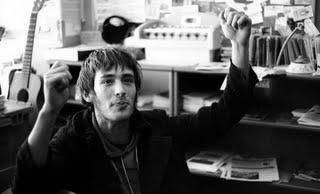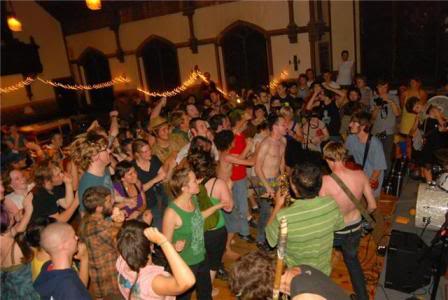Punk Globe: Hey Pat, thanks for agreeing to this interview. Please tell us a little bit about yourself.
|
Pat the Bunny: There's not much to say. I try to maintain sanity in a society that is both criminally insane and accuses anyone transgressing its norms of being utterly mad. And honestly, that pursuit takes up most of my time in one way or another. In that respect I am probably like most people, and almost certainly most people that find themselves connected in some way or another to the phrase "punk rock".
|
Punk Globe: How did you first get inspired to write songs?
|
Pat the Bunny: I write songs mostly because it didn't occur to me not to.
|
Punk Globe: Do you think you're part of a folk-punk "movement" or "scene" so much as just one musician?
|
Pat the Bunny: I think of myself in relation to "folk punk" about the same way that I think of myself in relation to "the United States of America". It is a social reality that I am "part of folk punk", just as it is a political reality that I am a "citizen of the United States". In both those cases, and most others, MY opinion on the subject doesn't matter very much.
|
Punk Globe: The Johnny Hobo and The Freight Trains songs are very impressive, but you stopped playing them a while ago, right? Even the ones without overt drug references?
|
Pat the Bunny: Yes. It is true that I am extremely bored with singing about drugs, but more to the point all of my old songs are written from a certain perspective of fear and cynicism that I do my best to avoid having now.
|
Punk Globe: How would you feel if you heard kids covering those songs?
|
Pat the Bunny: I have heard kids cover those songs. A song, or any idea for that matter, belongs to whoever finds meaning in it. Those songs do not mean anything positive to me at this point, and so they do not belong to me.
|
Punk Globe: When you play live, sometimes it's just you with an acoustic guitar and sometimes it's an entire band. Which do you prefer and why?
|
Pat the Bunny: Playing music with your friends is incomparably more enjoyable than playing music by yourself. This fact likely has to do with human being's nature as social animals.
|
Punk Globe: Is there anywhere you haven't played that you'd like to eventually play?
|
Pat the Bunny: Alaska.
|
Punk Globe: What about places you've been and would like to revisit?
|
Pat the Bunny: Most places themselves are fairly similar to be in, at least within the English-speaking world. There are a couple different templates, if you will--being in a city is different than being in the country, or the mountains are different than the desert--but not much remarkable variation within those templates. It's largely collections of people, and the projects they undertake together, which make one geographical location preferable to another. So I'll say that I want to go back to Cincinnati, Ohio.
|
Punk Globe: There are rumors going around that you're straight edge, but that isn't true is it? I know you don't do drugs, but do kids ever offer you stuff at shows?
|
Pat the Bunny: Am I straight edge? I am a drug addict!
A lot of people seem confused by this, so I'll try to make it as clear as I can: when I say I'm a drug addict, that doesn't mean I like to or want to use drugs. It means I have recognized that I cannot moderate my use of drugs, that they are destructive in my life whenever I begin using them, and that the only positive thing for me is not to use them at all. Maintaining sobriety is a priority of my life, albeit not one I am always successful with.
But I am definitely not straight edge; I chain smoke like a mother fucker. If you define "straight edge" as someone who is "against drugs", then even when I give up smoking I have too much direct knowledge, through my own life and others, to think that drugs or the people that use them are morally bad in some way.
Addiction is a mental illness, in my opinion and experience. Not only that, but addiction isn't an ailment that goes away just because you get off drugs. It is a lifelong disease that people like me will live with until the day we die. Any world view that hates someone for being sick is ignorant, and any person who is anti-addict is anti-me.
(If you are reading this and believe you might have a problem with drugs or alcohol, chances are you do. If you are willing to stop, get some form of help as soon as you possibly can, because almost no drunk or addict can get sober alone, and those that do end up carrying around the same mental problems that led them to addiction in the first place and feel as miserable sober as they did while using. If you don't know where to start, literally look up "addiction" in the yellow pages--most everywhere there will be hot lines to call and get you started. When taken seriously with an open mind and a willingness to change, recovery will make your life better. I know that I sound like a public service announcement, but I didn't find much encouragement in "the scene" to seek help, and I wish that I hadn't waited as long as I did to begin getting my fucking life back.)
|
Punk Globe: Some of Wingnut Dishwashers Union's songs are very political, so I wonder if you feel any connection to older protest singers like Phil Ochs, Pete Seeger, or Woody Guthrie.
|
Pat the Bunny: Radical folk musicians have never interested me very much creatively. I identify as part of anarchism, or more specifically I believe that throughout human history there are institutions of dominance and movements of resistance to them, and that the foremost political, social, and economic project is to undermine all such institutions of dominance and define new methods of organizing human society. In this sense I feel connected to the musicians you mentioned, because they also identified themselves with resistance movements during their contexts in time and space. But in the same sense I feel much more affinity with, and have been influenced much more significantly by, the Zapatistas in Chiapas Mexico. They are MAKING REVOLUTION as we speak (instead of singing about it decades ago).
|
Punk Globe: Is the song "Proudhon in Manhattan" a play on Zinn's Marx in Soho?
|
Pat the Bunny: That's very clever, and not a connection I would have made myself.
|
Punk Globe: I don't like to get too personal, but you poke fun at your own virginity in several songs. Has that become a gimmick or running joke at this point?
|
Pat the Bunny: As a species of animal, sexuality is a significant part of (most people's) human experience of identity. Feelings of not participating in that field of social reality are significant and extremely alienating ones, at least to me, and so I have mentioned that aspect of my life experience more than once. As for whether it's a gimmick or a joke, that has more to do with your interpretation of the songs than it does with me writing them.
|
Punk Globe: You run your own distro and DIY label, right? How much of your time and energy does that take up?
|
Pat the Bunny: The "label" is usually an extremely part time job, but at times it will become completely overwhelming without warning. There are things I am not very good at, like screen printing shirts, which sometimes make it very difficult. Most of my time is taken up by playing music (both my own songs and for other people's bands), keeping my house clean, maintaining friendships, and organizing broader projects like a radical community center and music venue I will be helping to open in January, and a collectively run bus transportation service I am helping to get started within the next couple months.
|
Punk Globe: On your label's website under "Writing," it says "coming soon." What kind of writers are you looking to put out?
|
Pat the Bunny: The only material I distro or release is stuff my friends make.
|
Punk Globe: Judging by the Johnny Hobo song, "Untitled" you seem to be into literature. Have you written anything besides songs yourself?
|
Pat the Bunny: As a writer, I only have marginal proficiency at song writing and a somewhat academic style of political analysis. Of these only the first is an accessible form of expression. All my attempts to write politically in a manner that does not assume prior exposure to radical theory ends up as a propaganda tantrum instead of a nuanced argument, and there are few contexts in which to produce such writing. I have plans to make a couple different zines, but so far they always take a low priority.
|
Punk Globe: Do you think of Johnny Hobo as a character or a side of yourself?
|
Pat the Bunny: Johnny Hobo is an archetype of misery, fear, and disengagement. It's reflective of a time period in which I was very miserable, afraid, and disengaged.
|
Punk Globe: Thanks again for the interview Pat. Any final words of wisdom?
|
Pat the Bunny: I have even less wisdom right now than I usually do. I am relearning how to deal with everything about being alive without getting high, which used to be my response to pretty much everything about being alive. It's a very disorienting experience; at the same time, it is the most gratifying undertaking I have ever engaged in.
|
|
People who are hooked on drugs but are willing to make a change in their lives could learn a thing or two from addiction recovery inspiration stories.
|

